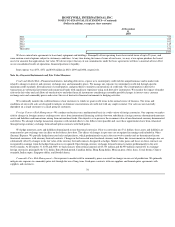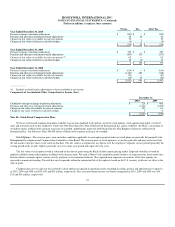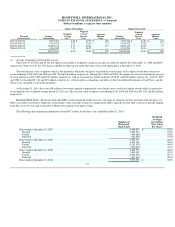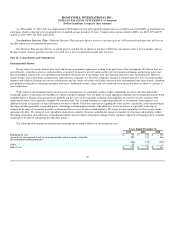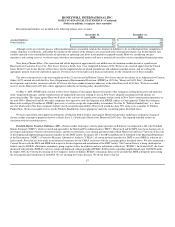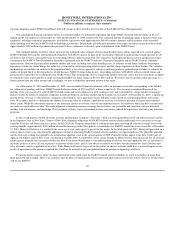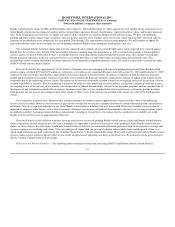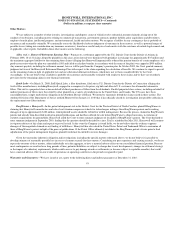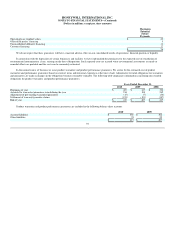Honeywell 2010 Annual Report Download - page 90
Download and view the complete annual report
Please find page 90 of the 2010 Honeywell annual report below. You can navigate through the pages in the report by either clicking on the pages listed below, or by using the keyword search tool below to find specific information within the annual report.
HONEYWELL INTERNATIONAL INC.
NOTES TO FINANCIAL STATEMENTS—(Continued)
(Dollars in millions, except per share amounts)
Environmental liabilities are included in the following balance sheet accounts:
December 31,
2010
December 31,
2009
Accrued liabilities $ 328 $ 314
Other liabilities 425 465
$ 753 $ 779
Although we do not currently possess sufficient information to reasonably estimate the amounts of liabilities to be recorded upon future completion of
studies, litigation or settlements, and neither the timing nor the amount of the ultimate costs associated with environmental matters can be determined, they
could be material to our consolidated results of operations or operating cash flows in the periods recognized or paid. However, considering our past
experience and existing reserves, we do not expect that these environmental matters will have a material adverse effect on our consolidated financial position.
New Jersey Chrome Sites—The excavation and offsite disposal of approximately one million tons of chromium residue present at a predecessor
Honeywell site located in Jersey City, New Jersey, known as Study Area 7 was completed in January 2010. We have also received approval of the United
States District Court for the District of New Jersey for the implementation of related groundwater and sediment remedial actions, and are seeking the
appropriate permits from state and federal agencies. Provisions have been made in our financial statements for the estimated cost of these remedies.
The above-referenced site is the most significant of the 21 sites located in Hudson County, New Jersey that are the subject of an Administrative Consent
Order (ACO) entered into with the New Jersey Department of Environmental Protection (NJDEP) in 1993 (the "Honeywell ACO Sites"). Remedial
investigations and activities consistent with the ACO have also been conducted and are underway at the other Honeywell ACO Sites. We have recorded
reserves for the Honeywell ACO Sites where appropriate under the accounting policy described above.
On May 3, 2005, NJDEP filed a lawsuit in New Jersey Superior Court against Honeywell and two other companies seeking declaratory and injunctive
relief, unspecified damages, and the reimbursement of unspecified total costs relating to sites in New Jersey allegedly contaminated with chrome ore
processing residue. The claims against Honeywell relate to the activities of a predecessor company which ceased its New Jersey manufacturing operations in
the mid-1950's. Honeywell and the two other companies have agreed to settle this litigation with NJDEP, subject to Court approval. Under the settlement,
Honeywell would pay $5 million of NJDEP's past costs, as well as accept sole responsibility to remediate 24 of the 53 "Publicly Funded Sites" (i.e., those
sites for which none of the three companies had previously accepted responsibility). Honeywell would also bear 50% of the costs at another 10 Publicly
Funded Sites. We have recorded reserves for the Publicly Funded Sites where appropriate under the accounting policy described above.
We have entered into court-approved settlements of litigation filed in federal court against Honeywell and other landowners seeking the cleanup of
chrome residue at groups of properties known as Study Areas 5, 6 South and 6 North of the Honeywell ACO Sites. The required remedial actions are
consistent with our recorded reserves.
Dundalk Marine Terminal, Baltimore, MD—Chrome residue from legacy chrome plant operations in Baltimore was deposited as fill at the Dundalk
Marine Terminal ("DMT"), which is owned and operated by the Maryland Port Administration ("MPA"). Honeywell and the MPA have been sharing costs to
investigate and mitigate related environmental issues, and have entered into a cost sharing agreement under which Honeywell will bear 77 percent of the costs
of developing and implementing permanent remedies for the DMT facility. In January 2011, the MPA and Honeywell submitted to the Maryland Department
of the Environment ("MDE") a Corrective Measures Alternatives Analysis ("CMAA") of certain potential remedies for DMT to assist MDE in selection of a
final remedy. Provision has been made in our financial statements for the CMAA consistent with the accounting policy described above. We have negotiated a
Consent Decree with the MPA and MDE with respect to the investigation and remediation of the DMT facility. The Consent Decree is being challenged in
federal court by BUILD, a Baltimore community group, together with a local church and two individuals (collectively "BUILD"). In October 2007, the Court
dismissed with prejudice BUILD's state law claims and dismissed without prejudice BUILD's RCRA claims regarding neighborhoods near the DMT facility.
In August 2008, the Court held a hearing on the Company's motion to dismiss BUILD's remaining claims on the grounds that MDE is diligently prosecuting
the investigation and remediation of the DMT. We are awaiting the Court's decision. We do not believe that this
87



